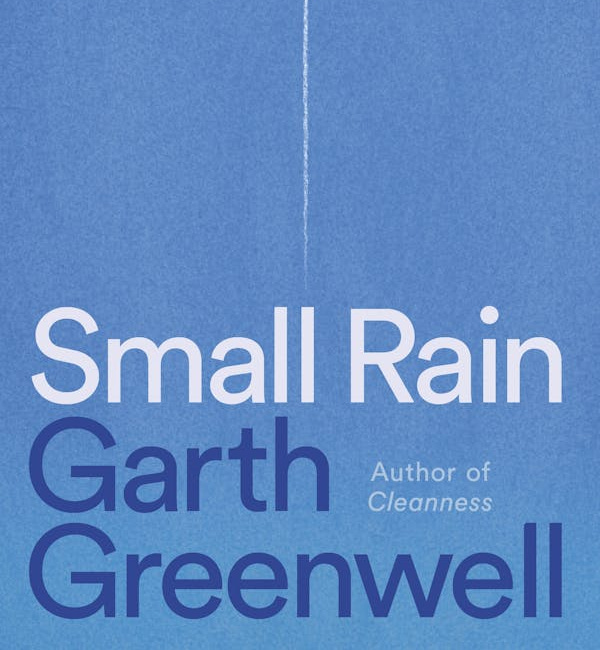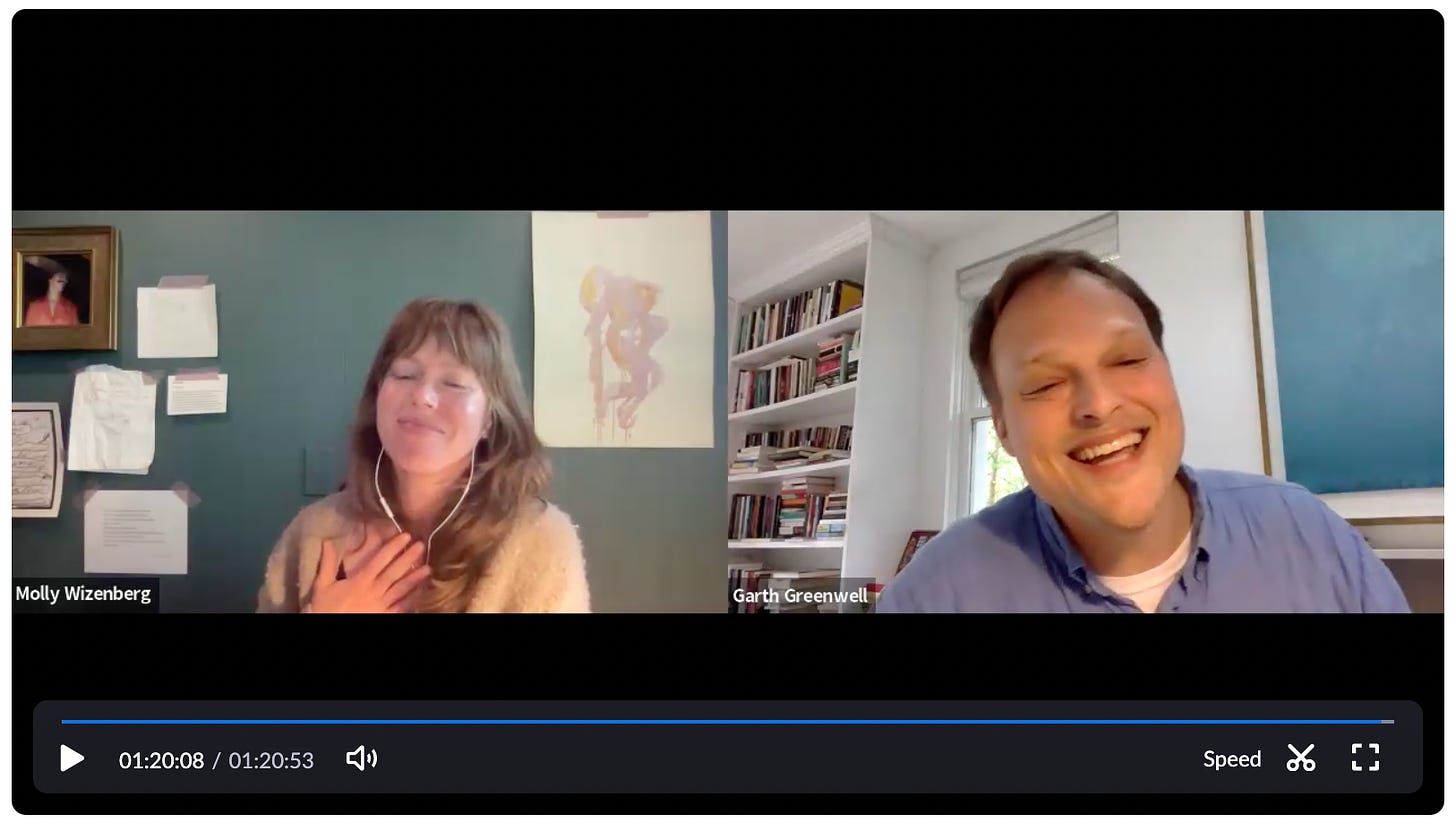Every so often, I get on Zoom with someone whose work and mind I admire, and then I bring our conversation to you. Today — and last week — that someone is the novelist, literary critic, and educator , whose third book Small Rain was published on September 3.
Because I hated to cut much of anything from our conversation, I broke it into two installments, the second of which is below. As you’ll see, we cover a semi-staggering amount of ground — let’s call it a Greenwellian expanse? — from happiness to cats, dogs, and transcendence.
N.B. If you missed part one, I highly recommend that you read it first:
What follows has been edited for clarity and brevity, and any errors are mine.
Thank you, Garth.
MW: I’m thinking again of “The Frog King,” and how that story, which presents the least friction-filled happiness in Cleanness, how it’s still quite a devastating story. The reader already knows that this love will end. So I want to talk about the happiness in Small Rain, because it has a very different texture from the happiness of your other work. The love story of Small Rain has more light than your previous love stories. What was it like to write that kind of love?
GG: Really more than anything else — well, in one sense, it’s a book about a guy who never leaves his bed. In another sense, it’s a book about everything that I could make it about. It’s about what it means to be a human being, what it means to be a thinking creature in a particular body, what it means for that body to break down or threaten to break down — but to me, most fundamentally, this is a book about love, a love letter from the narrator to his partner. In Cleanness, by the time you reach [“The Frog King”], you know that the love story has ended. There’s this elegaic quality to the happiness. There’s not the same sense of an immediate horizon in Small Rain. This is a love, a partnership, that is intended to be sort of permanent. What was it like to write that . . . ? [Laughs.] Sorry, my cat is rubbing up against the computer.
MW: You’ve described writing “The Frog King” as being heartbreaking.
GG: It was. You know, I always think of the wonderful Keats “Ode on Melancholy,” which I always say is my favorite craft lecture. Keats sort of says, If you want to convey melancholy, write about joy. He says, “Joy, whose hand is ever at his lips / Bidding adieu.” But that’s not true in Small Rain. Oh, in some sense, it’s true, because for much of the book, the narrator thinks he might die. But in another sense, L is not leaving [at a set date in the future, like the narrator’s partner in “The Frog King”]. These are two people who are committed to each other and who have built a life with each other.
I’m thinking of Baldwin again, who I’ve been thinking a lot about lately, and there’s this wonderful moment in Another Country, which is the first book in which Baldwin is able to imagine an even possibly durable love between two men, when the younger lover in this couple says to his older lover, “Love is expensive. If you don’t put furniture around it, it leaves.” L and the narrator have put furniture around their love, quite literally. This is a love that is an experience of plenitude.
I do think this is a happy book. It’s a book with a lot of pain and a lot of suffering, but I think it’s a happy book. It’s a book that is finally about someone recognizing — by refusing to deny — the fact of death, the fact of darkness, the fact of finitude, the fact of limitation, that he is able to enter into the full presence of his joy. And it is not by rejecting negativity or pretending that negativity doesn't exist. It is accepting negativity — acknowledging negativity, in some sense embracing negativity — that allows him to step into the fullness of this joy. It is not an operatic or dramatic joy. It is a common life, a commonplace life, you know — a life in this Midwestern town, in this little house, that is also extraordinary. It’s a joy that was not available in the first two books.
MW: The way this narrator arrives at this kind of joy feels so right, and so rightly complicated, in light of what he grappled with in the first two books. Do you think of Small Rain as the conclusion of something?
GG: You know, they’re each their own thing. You can meet Small Rain without knowing the first two books. But I do think of them as chapters in a larger project, and if I write this Kentucky novel, that will also [be part of it]. I’m drawn to the model of books as well-made autonomous things that are also sort of chapters in an ongoing, single-ish project. But I don’t know. Maybe in ten years I’ll want to write a book about dragons.
MW: [Laughing] I can’t wait.
GG: I mean, I would, I would really be into that. Like, I would actually really like to do something like that. But right now I think I have two books in my head, and both of those will also be unfolding chapters.
MW: Speaking of dragons, I know we’re pretty much out of time here, but I want to ask about animals. I have to ask about all the dogs in your work, [laughing], especially for someone who has two cats and no dogs . . .
GG: [Turning the computer to show his cat Pedro, who is curled up on a cat bed on the desk] I know, I know. I mean, look at him, isn’t he . . . ? [Voice trailing off, cooing.] He spends most of the day here with me. I’m really lucky. And I do feel a little sheepish about the fact that [Small Rain and Cleanness] both end with dogs. I do feel very strongly that my next book cannot end with a dog.
MW: [Laughing]
GG: I would like to write like in a more sustained way about relationships with animals, because they have been such profound parts of my life, and they do feel like really profound relationships. If there is a kind of angelic presence in my books, it has been dogs.
In some sense, they are creatures whose desires can be met, and they are creatures who, at least in a moment, can be adequately cared for in a way that, you know, maybe humans can’t be. There’s a way that humans’ needs are infinite. And I’m not sure a dog’s needs are infinite. And somehow this image of a dog playing with a ball at the dog park, and the sort of fullness of joy that is a dog playing with a ball — that’s an image of a kind of ideal of existence, a kind of distillation of what is precious in life. A dog with a ball — [laughs] — maybe that’s what it’s all about, what existence is for. I don’t know that I really think that. But there’s this purity — again, in the most banal situation possible. Because of the experience the narrator has been through, and because he’s sitting on a bench with L, he’s able to see in that situation what is really a kind of transcendent being, a purity of being, capital-b Being. Dogs give us access to that. Cats too, but maybe cats are slightly more complicated.
MW: And the image of a dog playing with a ball — it evokes, viscerally, a kind of thrumming fullness of life. The reader can really feel it. That image, and all the aesthetic experiences we accumulate over the course of reading the book — in the end, it becomes pure feeling.
GG: The expressions of that, these moments we have, I guess this is what it is, you know? A moment where the finite touches the infinite, which is the promise of art. And it’s why my sense of art, finally, is incarnational. I am not a religious person. I am atheist, but I find Christian theology super helpful for thinking about art, because the whole premise of Christian philosophy is that there is a moment at the center of being where the infinite and the finite touch. I think that is the experience that art gives us.
When you look at a Cézanne painting, you are looking at a material object that is bound in a frame, that is a certain amount of chemicals applied to a certain amount of fibers, that is absolutely finite. And yet it is infinite, is inexhaustible. That Oppen poem is 34 words, but it is also infinite. It is inexhaustible. And there is something in human life that is obviously finite: we are all going to die, that is the only thing any of us can know for sure. And yet also, there is something infinite. And I think that’s what [the narrator of Small Rain] sees in that dog. And it’s what one can see anytime one opens oneself or is shocked into a sort of experience of the fullness of being. I think we have that sense that there is something, as you say, something sort of thrumming, something that is at once contained and also uncontainable. And yes, it is of a piece with all of these aesthetic experiences, all of these moments where something finite and material touches something that is infinite and immaterial, and that is what he sees in that dog, who has become the embodiment of desire, the embodiment of joy.
MW: Or maybe it’s me, sitting at the back of your reading, weeping openly . . . [laughing].
GG: That’s so beautiful. Thank you so much. That’s so moving for me to hear.
MW: Thank you. Would you be willing to read something from Small Rain?
GG: Why don’t — you know what — I mean, this is weird, and I will probably have very few chances to do it, but why don’t I read the very last paragraph of the book? Since that’s what we were just talking about.








